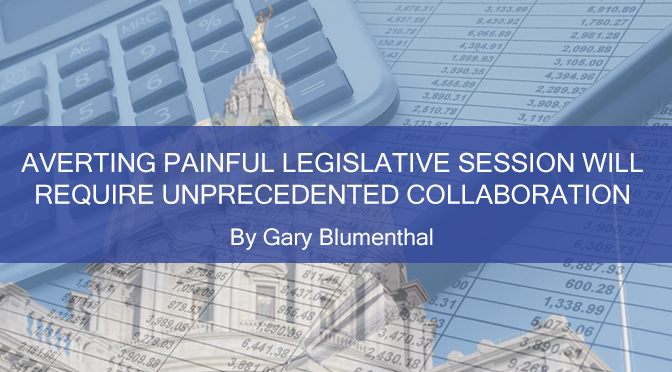|
|
By Gary Blumenthal
Mr. Blumenthal is Vice President of InVision Human Services based in Wexford, Reading and Harrisburg, Pennsylvania. He served in the Clinton and Obama Administrations as federal disability advisor and is a former Member of the Kansas House of Representatives.
As the Senate Republicans, Speaker of the House Nancy Pelosi, and the Trump Administration fail to reach an agreement regarding the desperately needed second COVID-19 assistance package, the stage is set for a bitter funding battle in the Pennsylvania General Assembly as budget talks begin November 10, 2020.
State legislators have spent the last seven months hoping for leadership, financial help, and guidance from the federal government before completing the state’s current fiscal year budget. Without assistance from the federal government, the Commonwealth is facing a $5 billion hole in its budget that cannot be repaired without deep and irreparable harm to our state’s citizenry.
When the General Assembly meets after the November general election, the choices facing legislators are rather bleak. If legislators are forced to make deep cuts, how does one trim $5 billion from an already thinly stretched annual budget? Likely impacted programs may include human services programs which are essential for allowing people to live healthy and meaningful lives. It’s unlikely we’ll see any government sector escape unscathed from forthcoming budget action, and this will disproportionately affect seniors, people with disabilities, and the poor with additional hurt felt by law enforcement, higher education, racial justice programs, and aid for our rural and urban communities.
Alternatively, state leaders could look at all revenue sources and see if the state can raise additional funds by rescinding earlier tax breaks to some sectors of the state’s economy or restructure how revenue is raised by placing a greater burden on the wealthy, thereby protecting low-income and middle-income taxpayers.
The intellectual disability and autism community rightfully is concerned about the future. 13,000 people remain on a state waiting list for needed supports and services, including over 5,000 on a state emergency waiting list. The Wolf Administration had proposed in February 2020 to fund services to reduce these waiting lists by 837 people, yet this proposal was not funded by the state’s current five-month budget and is likely at great risk as legislators complete the FY 20/21 budget.
In the last eight months, federal and state officials have decried the effects of the pandemic and saluted front line workers for their life-risking dedication to their jobs. For a few months of this ongoing public health crisis, the federal government dedicated funding from the federal CARES ACT to help states provide hazard pay for front line workers, including Direct Support Professionals who support people with intellectual disabilities; however, that funding will be in jeopardy unless the federal government provides additional support which, at the time of this writing, seems as unlikely to occur before the end of the year as a widely-available vaccine for COVID-19.
Surviving 2020 and fostering a positive outlook for the citizens of the Commonwealth will require General Assembly Republicans, Democrats, and the Governor to resist innate political instincts and act responsibly and collaboratively as the stewards of Pennsylvania’s future.
To act in the best interest of Pennsylvania citizens, General Assembly leaders must form effective, collegial working relationships with each other and the Governor to protect vulnerable people and the state’s economic prospects. This means putting aside political grievances and building a unified plan. Legislators must avoid reflexive criticism of proposals from the Governor and each other’s respective party.
The time for our political leaders to weigh each legislative proposal on only how it helps or harms the other party’s next election performance must end.
Today that call for civility is needed now more than ever.
Hopefully members of the General Assembly will work together during this crisis to find workable solutions to our state’s budget and health crisis by developing a consensus on how to move forward, even if that means embracing ideas from both political parties.
Information provided to TVL by:
Gary H. Blumenthal
Vice President, Governmental Relations and Advocacy
InVision Human Services
Innovative Approach. Shared Vision.
www.invisionhs.org







